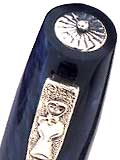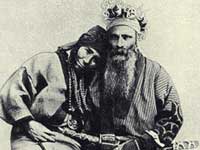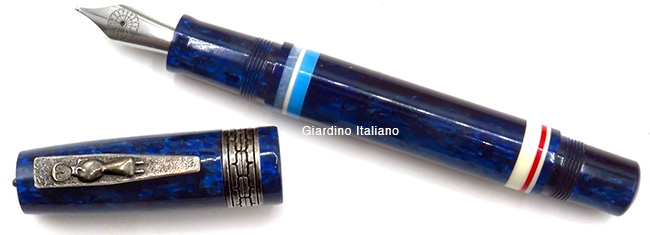

Honouring the Ainu, ancient Japanese people

AINU 


Limited Edition
1643 silver fp
1643 vermeil fp
43 gold fp
 Ainu
Ainu
Ainu means "human", and it's the name of people descendants of Mongoloid migrants who entered the Japanese islands approx 25,000-30,000 years ago and lived in Hokkaido.
Having no written language, the Ainu orally transmit tales, legends and moral rules from generation to generation. The songs are melodies consisting of only two or three different notes and in many cases imitate animal cries or birdsong.
In 1997, a new law provided funds for the research and promotion of Ainu culture such as language, traditional dancing and various ceremonies.
The Ainu pen - Indigenous People
Delta's Ainu pens (of Indigenous People series) were made in 2005 with a deep marbled blue resin, interweaved with rings in resin of various other colors.

 After the recent reopening, Delta found a number of Ainu which it reassembled and overhauled, equipping them with a new nib.
After the recent reopening, Delta found a number of Ainu which it reassembled and overhauled, equipping them with a new nib.
Both the nib and the cap top are decorated with the same design that represents a medal used in women's necklace, called "tamasay".
The clip offers a three-dimensional representation of the "nipopo"(wooden doll)
The central ring of the cap is enriched by a dark sterling silver decoration, relief-etched.

Previous
Indigenous People:
Masai,
Nativi Americani,
Inuit,
Tuareg,
Maori
Cossack
Ainu
Indios
Sami
Adivasi
Mapuche
Maya
Kanaka Maoli
Bri Bri
Papuasi
Sentinelesi
The fountain pens' nib is 18Kt white gold, personalized with thewith the "tamasay" pendent; and it's available as EEF, EF, F, M, B, Stub 1.1, and also OM and OBB.
Ainu was originally made in 3 versions:
1K with dark silver trims and cartridge/converter filling system;
1KS with vermeil trims and lateral lever filling;
Celebration, limited to only 43 pieces, vermeil top (with diamond) and clip, solid gold ring and lateral lever filled.
The version we sell (very few pieces) is the 1K, with cartridge/converter filling system, and dark silver finish.
The Delta NOS Indigenous People Ainu is packed in a standard box - the original personalized boxes have never been found.
The list price shown is updated from 19 years ago.









